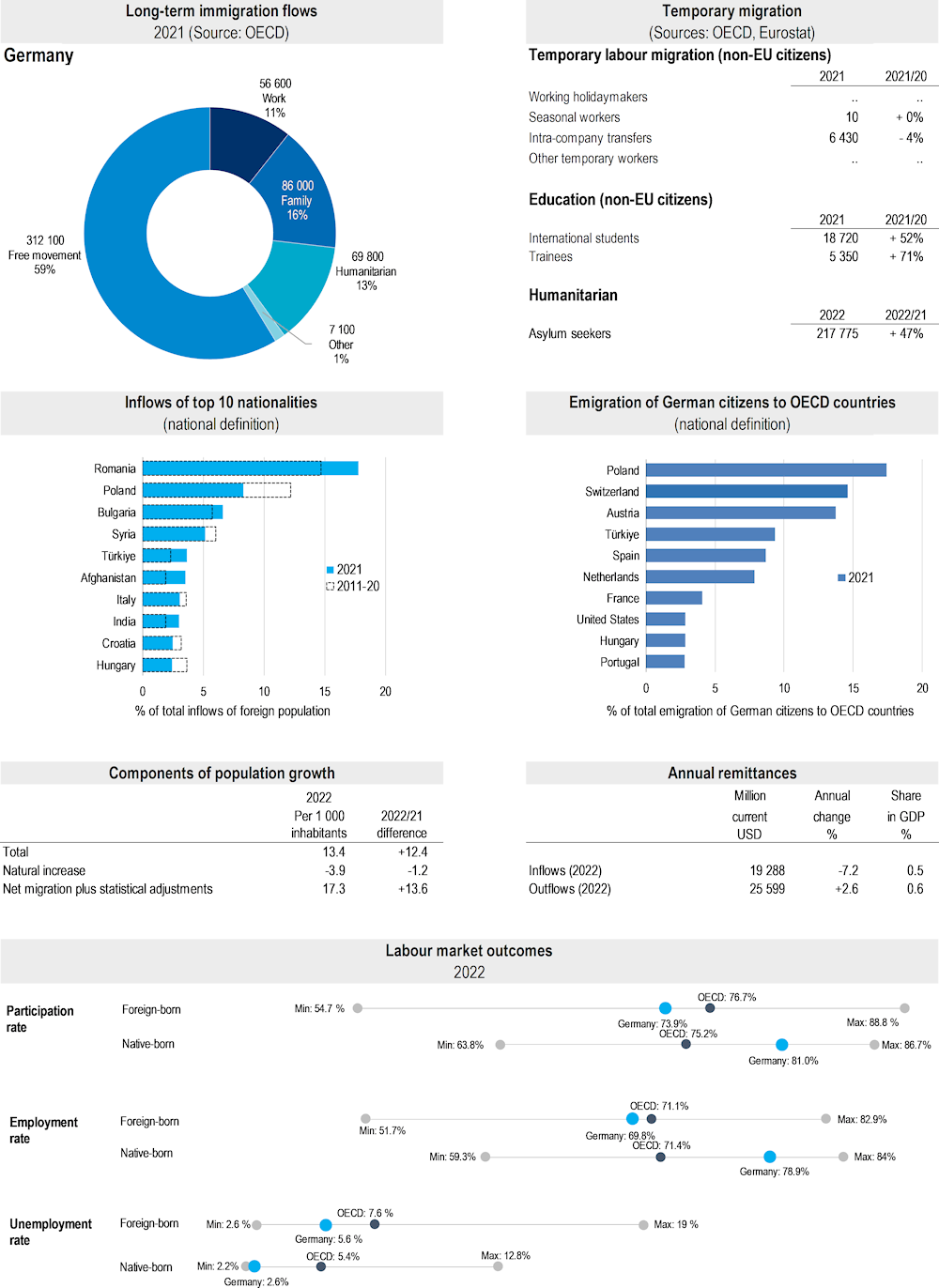In 2021, Germany received 532 000 new immigrants on a long-term or permanent basis (including changes of status and free mobility), 6.4% more than in 2020. This figure comprises 58.7% immigrants benefitting from free mobility, 10.7% labour migrants, 16.2% family members (including accompanying family) and 13.1% humanitarian migrants. Around 19 000 permits were issued to tertiary-level international students and 12 000 to temporary and seasonal labour migrants (excluding intra-EU migration). In addition, 430 000 intra-EU postings were recorded in 2021, a 5% increase compared to 2020. These posted workers are generally on short term contracts.
Romania, Poland and Bulgaria were the top three nationalities of newcomers in 2021. Among the top 15 countries of origin, Syria registered the strongest increase (+28 000) and Poland the largest decrease (‑7 400) in flows to Germany compared to the previous year.
In 2022, the number of first asylum applicants increased by 47%, to reach around 218 000. The majority of applicants came from Syria (71 000), Afghanistan (36 000) and Türkiye (24 000). The largest increase since 2021 concerned nationals of Türkiye (+17 000) and the largest decrease nationals of Iraq (‑400). Of the 198 000 decisions taken in 2022, 65% were positive.
Emigration of German citizens to OECD countries increased by 18% in 2021, to 141 000. Approximately 17% of this group migrated to Poland, 15% to Switzerland and 14% to Austria.
In March 2023, the government adopted a bill to further enhance the immigration of skilled workers from third countries by amending – among others – the Residence Act. The process of parliamentary validation has been completed in July 2023. The reform further modernises Germany’s immigration law, which will rest on three pillars: Skilled labour, job experience and potential. Skilled workers will be allowed to work in any unregulated profession. The reform also broadens the eligibility criteria for the EU Blue Card, e.g. by lowering the statutory salary requirements. Foreigners with qualifications that are not recognised in Germany but in their home country and who have at least two years work experience can immigrate and work in skilled occupations under certain conditions. Furthermore, the bill provides for the introduction of a new job-seekers permit, the so-called “opportunity card”. This permit allows third-country nationals on the basis of a point system (based on qualifications, language skills, work experience, ties to Germany and age) to stay in Germany for up to one year and look for work.
Other measures to attract foreign talent include Germany’s placement agreements with Jordan and Brazil for care workers in May and June 2022, respectively, and the extension of an earlier placement agreement with Mexico to include hotel and restaurant workers in March 2023. Workers recruited under these agreements can initiate the procedure for the recognition of their qualifications at the same time as they take up employment in Germany.
In October 2022, Germany launched an admission programme for Afghan nationals at risk. The programme allows authorised agencies to nominate Afghan nationals for admission to Germany who are at particular risk because of their commitment to a democratic Afghanistan, or who have experienced violence or persecution.
In December 2022, Germany implemented a new law that allows migrants with long-term tolerated status to obtain a residence permit for 18 months, subject to certain conditions (opportunity residence law). During this time, they can fulfil the legal requirements (e.g. acquiring language skills) for longer-term residence. In addition, the law changed the eligibility criteria for residence permits for young people with tolerated status and for those who can demonstrate “sustainable integration”. Other important elements of the law include direct access to integration and vocational language courses for asylum seekers, facilitated family reunification for skilled workers and more consistent deportation of criminals.
A law on streamlining asylum procedures came into force in January 2023. It provides for the abolition of the regular review of asylum decisions in the context of revocation and withdrawal procedures in favour of an ad hoc review, as well as the introduction of asylum counselling independent of the authorities.
In July 2022, the German Parliament elected the first independent Anti-Discrimination Commissioner, who will head the Federal Anti-Discrimination Agency for a period of five years. She has the right to participate in all projects related to her duties, as well as in legislative and policy proposals.
For further information: www.bmas.de | www.bmi.bund.de | www.bamf.de | www.arbeitsagentur.de

